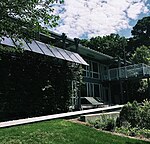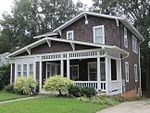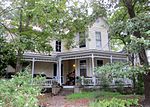Robertson Scholars Program
2000 establishments in North CarolinaDuke UniversityScholarships in the United StatesUniversity of North Carolina at Chapel Hill
The Robertson Scholars Leadership Program is a joint merit scholarship and leadership development program at Duke University and the University of North Carolina at Chapel Hill. The scholarship offers participants a unique "dual citizenship" at both Duke University and UNC-Chapel Hill. Approximately 25-30 students are selected from the pool of applicants to both universities.
Excerpt from the Wikipedia article Robertson Scholars Program (License: CC BY-SA 3.0, Authors).Robertson Scholars Program
Swift Avenue, Durham
Geographical coordinates (GPS) Address Nearby Places Show on map
Geographical coordinates (GPS)
| Latitude | Longitude |
|---|---|
| N 36.00187 ° | E -78.92239 ° |
Address
Swift Avenue 406
27705 Durham
North Carolina, United States
Open on Google Maps









